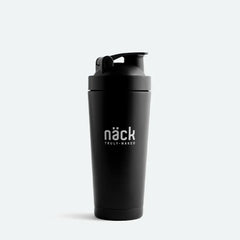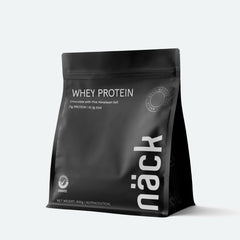Whey Protein
Whey Protein
Whey protein is a popular dietary supplement used by athletes and fitness enthusiasts to increase muscle mass and improve exercise performance. It is a complete protein, which means it contains all nine essential amino acids that the body cannot produce on its own and must obtain from the diet.
Whey protein is derived from milk during the cheese-making process. There are three main types of Whey protein: Whey concentrate, Whey isolate and Whey hydrolysate.
Whey concentrate is the least processed of the three and contains between 70% to 80% protein. The remaining 20% to 30% is made up of fat and carbohydrates, including lactose. Whey concentrate typically has a slightly higher level of bioactive compounds, such as immunoglobulins (proteins that are antibodies) and lactoferrin (globular glycoprotein that modulates antigen-specific immune responses), which may offer health benefits beyond basic nutrition.
Further processing is done to remove most of the fat and lactose and when the concentration of protein in the mixture reaches 90%, we get Whey isolate. Because it is more pure, it typically has a lower calorie, lactose and carbohydrate content than whey concentrate.
Increases muscle strength and performance:
Whey protein contains all nine essential amino acids, making it an excellent source of protein for building and repairing muscle tissue. Regular consumption of whey protein has been shown to increase muscle strength and improve exercise performance. This is due to its ability to enhance muscle protein synthesis and promote the growth of new muscle & tissue.
Study shows that dietary protein supplementation significantly enhanced changes in muscle strength and size during prolonged Resistance Exercise Training in healthy adults. Increasing age reduces and training experience increases the efficacy of protein supplementation during RET.
Consumption of whey protein has a robust ability to stimulate muscle protein synthesis. In fact, whey protein has been found to stimulate muscle protein synthesis to a greater degree than other proteins such as casein and soy. Biological value of eggs is 100 whereas that of Whey is 104.
-
A systematic review, meta-analysis and meta-regression of the effect of protein supplementation on resistance training-induced gains in muscle mass and strength in healthy adults. Br J Sports Med. 2020 Oct;54(19):e7. doi:10.1136/bjsports-2017-097608corr1.
Robert W Morton, Kevin T Murphy, Sean R McKellar et al.
-
Protein supplementation augments the adaptive response of skeletal muscle to resistance-type exercise training: a meta-analysis. 2012 Dec;96(6):1454-64. doi: 10.3945/ajcn.112.037556.
Naomi M Cermak 1, Peter T Res, Lisette C P G M de Groot et al
-
Biological values
https://www.ncbi.nlm.nih.gov/pmc/articles/PMC3905294/table/table001/
Improves endurance and recovery:
Whey protein can improve endurance performance by reducing muscle damage and fatigue during exercise. This may help to improve overall athletic performance and increase the duration of workouts. Exercise causes muscle damage and inflammation, and consuming whey protein after exercise has been shown to reduce these effects, allowing athletes to train more frequently and with greater intensity.
Seventeen untrained male participants were randomly separated into two supplement groups: whey protein isolate and carbohydrate. Participants consumed 1.5 g/kg.bw/day supplement for a period of 14 days following a unilateral eccentric contraction-based resistance exercise session. The major finding of the investigation was that whey protein isolate supplementation attenuated the impairment in isometric and isokinetic muscle forces during recovery from exercise-induced muscle injury.
In a double-blind crossover design, 12 trained men performed resistance exercise in the evening prior to consuming either whey protein or an energy-matched placebo immediately post-exercise, and again the following morning. A third randomised trial, completed by the same participants, involving no exercise and no supplement served as a rested control trial.
The trial concluded that Whey protein supplementation enhances whole body anabolism, and may improve acute recovery of exercise performance after a strenuous bout of resistance exercise.
-
Whey protein isolate attenuates strength decline after eccentrically-induced muscle damage in healthy individuals. https://www.tandfonline.com/doi/full/10.1186/1550-2783-7-30
Matthew B Cooke, Emma Rybalka et al
-
Whey Protein Supplementation Enhances Whole Body Protein Metabolism and Performance Recovery after Resistance Exercise: A Double-Blind Crossover Study. Nutrients. 2017 Jul 11;9(7):735. doi: 10.3390/nu9070735.
Daniel W D West 1, Sidney Abou Sawan et al
Helps with weight management:
Consuming whey protein can also help with weight management by promoting feelings of fullness and reducing appetite. This can make it easier to stick to a healthy diet and maintain a healthy weight, which can in turn improve athletic performance.
-
Effects of whey protein and resistance exercise on body composition: a meta-analysis of randomised controlled trials. J Am Coll Nutr. 2014;33(2):163-75. doi: 10.1080/07315724.2013.875365
Paige E Miller 1, Dominik D Alexander, Vanessa Perez
-
Whey protein supplementation preserves postprandial myofibrillar protein synthesis during short-term energy restriction in overweight and obese adults. J Nutr. 2015 Feb;145(2):246-52. doi: 10.3945/jn.114.200832. Epub 2014 Dec 17.
Amy J Hector 1, George R Marcotte et al
Sustained energy levels:
Whey Protein can help give more energy to power through your workout, or just stay energised throughout the day.
Anti-Fatigue Effect of Whey Protein Powder in Basketball Training- 2015 Oct 26. doi: 10.2174/1874120701509010330
Sun Ronghui
Supports immune function:
Intense exercise can suppress the immune system, which can increase the risk of infection and illness. Whey protein contains immunoglobulins and other immune-supporting compounds that can help to boost the immune system and reduce the risk of illness.
Digestive enzymes for easy digestion:
Whey protein powders typically contain digestive enzymes that can help break down the protein into smaller peptides and amino acids, making it easier for the body to absorb and utilise.
The main digestive enzymes found in Whey protein include:
Protease: This enzyme breaks down proteins into smaller peptides and amino acids, which can be absorbed more easily by the body.
Lactase: This enzyme breaks down lactose, a type of sugar found in milk, into glucose and galactose. This can be helpful for individuals who are lactose intolerant and have difficulty digesting lactose.
Lipase: This enzyme breaks down fats into fatty acids, which can be used as an energy source by the body.
Amylase: This enzyme breaks down carbohydrates into simple sugars, such as glucose and fructose, which can be used for energy.
The presence of these digestive enzymes in whey protein helps improve the absorption and utilisation of the protein, leading to better muscle growth and recovery.
Overall, whey protein is a great dietary supplement that can enhance athletic performance in a variety of ways, particularly in terms of muscle building, strength, endurance, immune function, and weight management.









